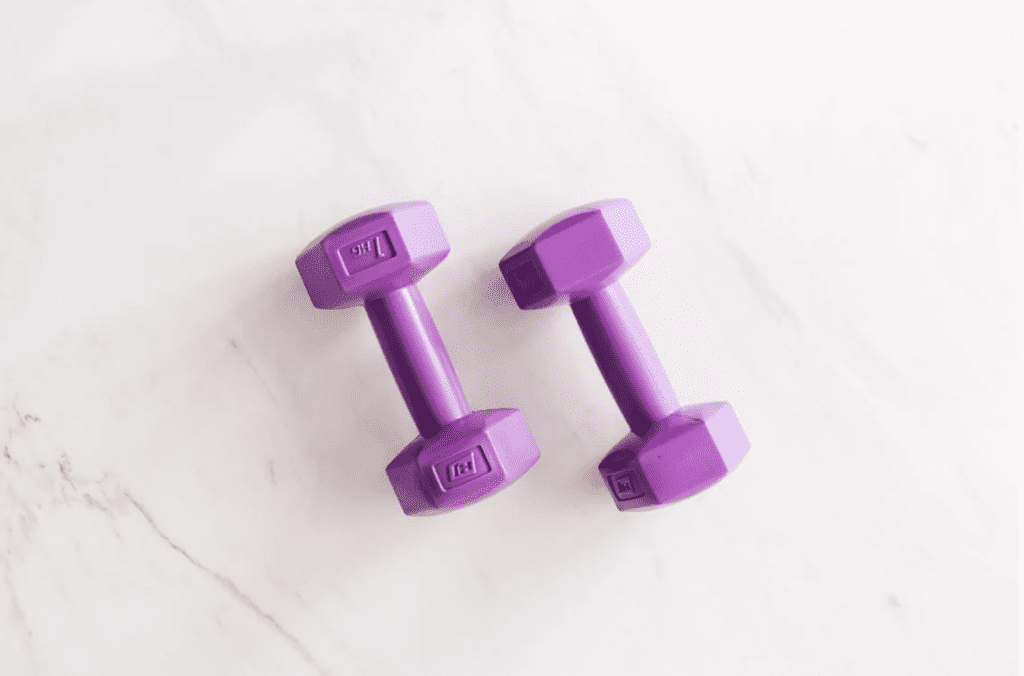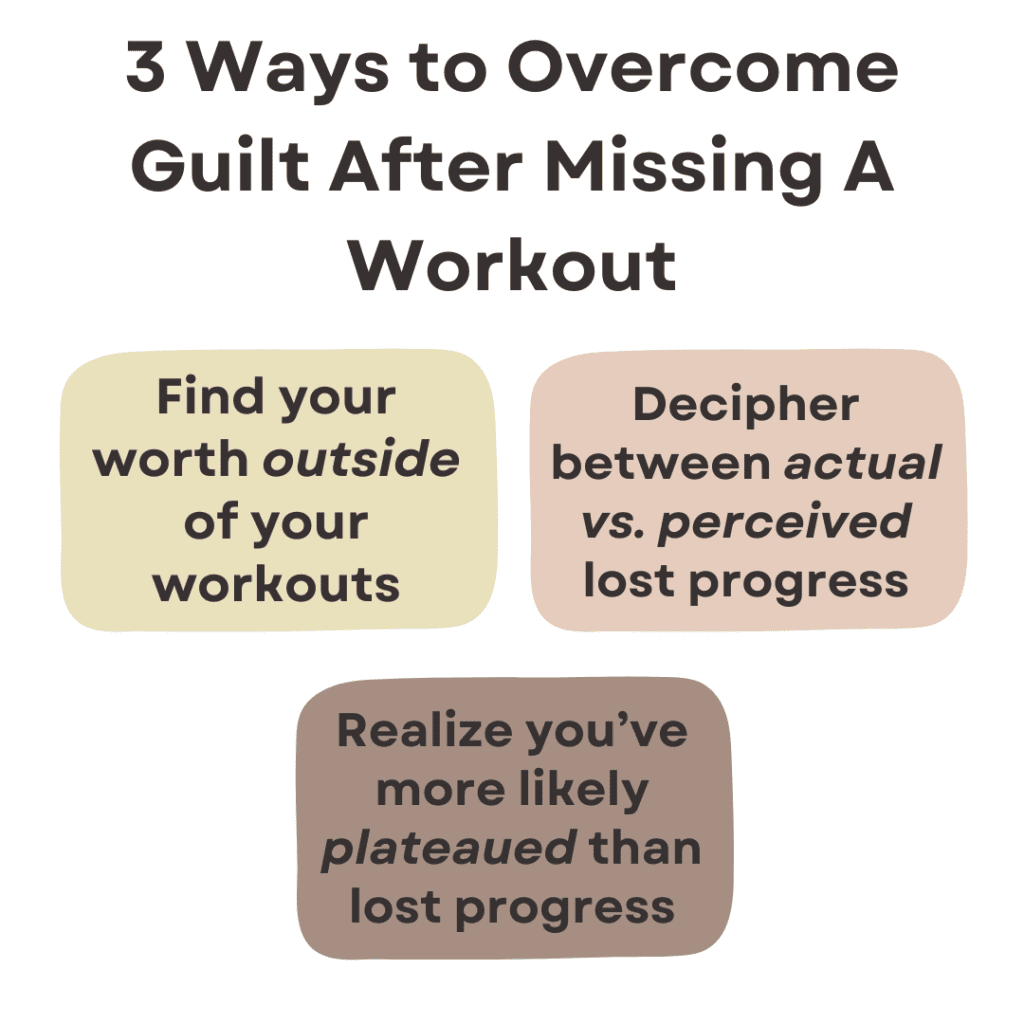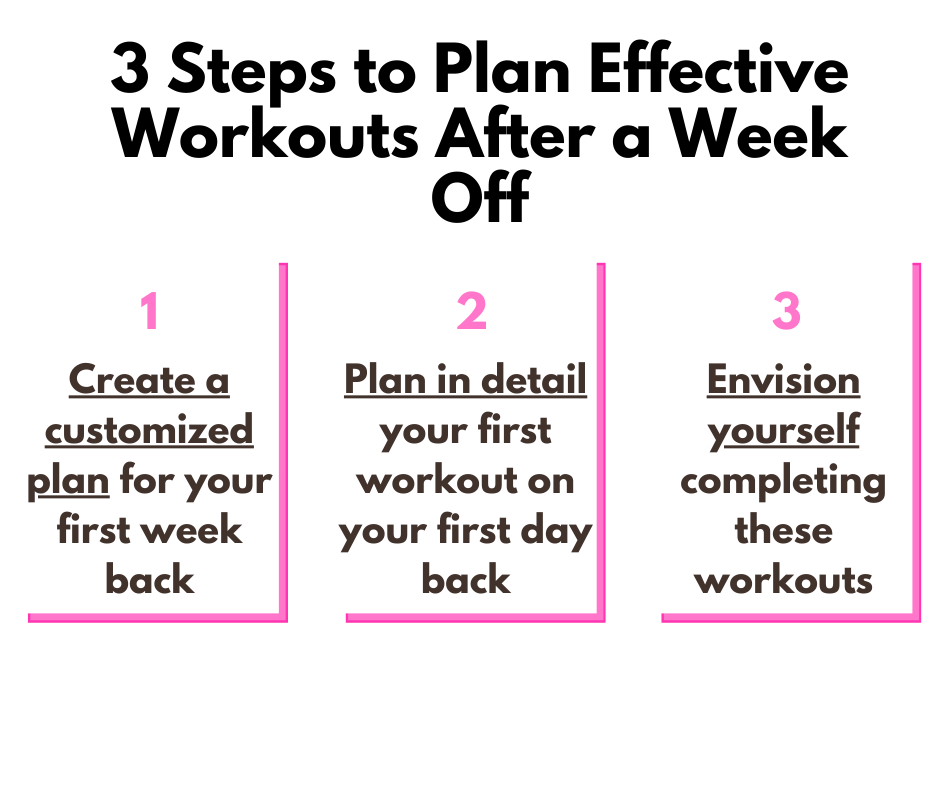
As weightlifting women, staying consistent in the gym is crucial for our progress.
However, things happen and life can get pretty busy, pretty quickly.
Times like these can make it really difficult to stay consistent in the gym, week in and week out.
No matter who you are and how committed you may be, life happens.
And it happens to everyone.
The key is to shake off any workouts you missed and learn how to get back on your feet again. While also avoiding any guilt and discouragement you might feel.
In this post, I want to dive into exactly how to get back on track physically and mentally after missing a week of workouts.
In This Post You’ll Find:
Missed Workouts Can (and Probably Will) Happen to Everyone
If you’re on a life long fitness journey, there are going to be times when you have to skip your workouts.
You might think that you’ll never have to miss a workout, and I applaud you for how committed you are, but things can happen.
And most likely, things that are unavoidable and outside of your control.
The truth is things happen in life. Things we can’t always avoid.
And that’s okay.
Putting too much pressure on yourself to always be in the gym and never miss a workout is unrealistic.
Yes, consistency is key to seeing progress. And so is pushing through times when you aren’t motivated to workout.
In no way am I saying to make skipping the gym a habit or to skip your workouts when you just don’t feel like going.
If you do that, you’ll never see progress.
What I’m really saying is that it’s okay to miss a workout when you really need to.
Prioritizing the gym over everything else in life is unhealthy. It’s important to recognize when things come up that should be higher priority than your workouts.
Think about it, family stuff happens, you might get sick, bigger things may come up, or whatever it may be that’s outside of your control.
But prioritizing certain things over the gym is part of a healthy and balanced lifestyle.
So you might just have to miss a few workouts in order to prioritize your relationships, your own health, and your experiences.
When this happens, the most important thing is learning how to bounce back and get back on track when these life events come between you and your workouts.
Overcoming Guilt From Missing Workouts
The worst, absolute worst thing you can do after missing workouts is beat yourself up over it.
But sometimes, these negative thoughts are hard to avoid.
Workout guilt is a real thing and so many of us experience it.
Probably a lot more of us than will admit.
Feeling like you’ve lost all your progress, that you’re a failure, or any having other self-depreciating thoughts after missing a workout is normal, but can become unhealthy.
In a way, this feeling is good. It let’s you know you really care about showing up for yourself and you aren’t cheating yourself of your workouts.
However, these negative thoughts can get out of hand, fast.
Once you feel like these thoughts start eating you up, that’s when things have gone too far.
Holding on to these negative feeling only brings you down and discourages you from returning to the gym again.
There’s no reason to feel guilty for genuinely having to miss workouts.
If you’re really committed, you’ll be back on track in no time.
In the meantime though, overcoming these guilty feelings is key to picking yourself back up again.
And although it’s easier said than done, one way to do this is to detach your worth from your workouts.
Detaching Your Worth From Your Workouts
It’s important to realize that yes, working out is good. However, whether you workout or not does not make you any more or less worthy.
Read that again. Your worth is not attached to your workouts!
Sure, working out is healthy, important, and key to a healthier lifestyle. Regular exercise is excellent to implement as part of your routine.
However, your day to day workouts have nothing to do with your current worth.
You aren’t any better on the days you workout, and you aren’t any worse on the days you don’t.
Just because you miss a week of workouts doesn’t make you any less worthy than the weeks when you successfully complete all your workouts.
It’s much more important to look at what you do most of the time, than looking at what you do day by day.
If you stay consistent with your workouts most of the time, then long term you’ll see the most benefits and become the healthiest version of yourself.
The days you missed your workouts won’t matter as much compared to how many days you completed your workouts.
On top of that, there’s more to life and to yourself than your physique, how heavy you can lift, and your workout progress.
It’s okay to feel like you went backwards or took a week off from making progress.
No matter where you are in your fitness journey, your worth isn’t defined by that. You’re still the same you!
You Didn’t Lose as Much Progress as You Think You Did (if you even lost any at all)
More likely than not, one of the biggest guilt factors after missing a workout is progress related.
By this I mean you feel like you lost all your progress in the short amount of time you were away from the gym.
Maybe you feel like you lost tons of muscle mass, gained back any weight you had lost, or now look and feel the same as before you started your journey.
But realistically, all of this is nearly impossible to happen after missing just one week of working out.
Most likely any lost progress you think you see is your mind trying to trick you.
Let’s think about it logically.
It takes so long to make progress in the gym, there’s no way you could lose it all in such a short amount of time.
It’d be impossible!
For example, it takes at least two weeks for your muscles to atrophy. Meaning it takes two weeks for you to start losing muscle mass.
And for any weight gain or loss, it takes an additional 3500 calories over your maintenance for you to gain just one pound of fat.
It’s really unlikely that you ate that many calories over your maintenance in just one week. And even if you did, you will have only gained one pound of fat.
Your Progress Isn’t Lost, But You Still See Changes
More likely than not, you didn’t lose very much progress in your week off from the gym. If you even lost any at all.
Instead, you probably just haven’t made any additional progress in your week off.
Meaning you’ve stayed at a plateau.
You didn’t gain or lose any muscle, strength, or fat. With maybe just very slight, slight changes.
If you think your muscles look smaller, you’re most likely just seeing them without a pump.
Which you’re not used to since you normally train regularly.
And if you notice changes in the scale, you’ve most likely gained some water weight from your lack of physical activity.
Meaning your body is holding on to some extra water, but didn’t gain any fat.
But once you return to the gym, you’re likely to just pick up where you left off. No more progress and hardly any lost progress.
As long as you’re not making skipping your workouts a habit, your few, very rare missed workouts won’t have that much of an impact on your progress.

A Women’s Guide to Resuming Workouts After a Break

Leave Your Missed Workouts Behind You and Start Looking Forwards
At this point, your missed workouts are behind you. It’s best to keep them behind you and leave them in the past.
Spending too much time dwelling on the past is the best way to hold yourself back from moving forwards.
Like I was saying before, in the long term, what you make a habit is far more important than what you do day by day.
Meaning if you’re consistently sticking to your routine, the days you miss your workouts won’t have much of an impact on your long term progress.
That is, if they even have any impact at all.
But by spending too much time focusing on the past, dwelling on any progress you think you lost or missed out on, will only hold you back even more.
What’s done is done, and now’s the time to look at what’s ahead.
Once you can start looking forwards, leaving behind any feelings of guilt or lost motivation, you’ll find new motivation for the future.
This will give you the momentum you need to start up again and focus on what’s ahead.
And what’s ahead just happens to be more workouts, progress, and consistency.
Make a Plan to Get Back on Track After Extended Time Off From The Gym
Like I was saying before, it’s time to leave your missed workouts behind you and start looking at what’s ahead.
One way to do this is to make a plan for how you’re going to get yourself back on track.
Meaning start planning how you’re going to get back in the swing of things.
Start by making a customized workout plan for your first week back in the gym.
Plan how you’re going to make each workout strong, effective, and intense.
Your first workout back is what’s going to give you the most momentum, so you want to make this a good one.
Start by determining what muscle group you want to train for your first workout that week.
Personally, I recommend training your main focus muscle group.
For me, that would be my legs.
Since my leg workouts are always intense and effective, and my legs are my main priority to grow.
After that, plan each individual exercise you want to do in that workout. Pick your favorite exercises that you think are the most effective and that give you the best pump.
Finally, envision yourself successfully completing this workout and how productive you’re going to feel afterwards. This will set yourself up for a strong, successful workout.
Starting things off strong will give you the momentum you need going forward.
On top of that, it’ll also help give your workouts structure and a clear direction.
That way avoiding any confusion your first week back and helping you stay motivated in your workout routine.

Ease Back into Your Workouts to Transition Back into Your Routine
Although you might be eager to hit things full force at this point, I strongly suggest you don’t do that.
It’s hard, I know!
What you should do instead though, is try your best to start off slow and ease back into things.
I know, probably not at all what you want to hear at this point. But it’s worth it!
It’s important to remember that when you’re returning to your workouts after extended time off, your body isn’t exactly where it used to be.
I like to say your body will be out of the swing of things. It’s a little less adjusted to your routine than when you left off.
That’s why you never want to jump back into things at 100%, your body just isn’t used to things.
But still, this doesn’t mean you lost any progress and you can transition back into things very quickly.
You’ll still need to give yourself some time to adjust back into your routine and your workouts again.
And just a day or two might be all your body needs.
You can try things like lowering the weight, reps, or number of exercises you do during your first few exercises back.
That way you can avoid rushing into things too quickly. And avoid any injuries from working out or slowed progress.
Which are most likely two things that you don’t want to happen.
Plan for Additional Rest to Successfully Recover When Resuming Gym Sessions
Again, although you might be eager to get back into the swing of things, you’ll want to be prepared to allow yourself extra rest days during your first week back.
Like I was saying before, when you take some additional time off, your body gets out of the rhythm of things.
Once you return to working out, you’re a lot more likely to get sore from your workouts.
Even if you’re doing the same workouts and exercises you were before your week off!
You’ll need to give your body more time to recover than usual. Only temporarily though.
So when you’re planning these returning workouts, you’ll probably want to add in some extra rest days. Or at least be prepared to add in extra rest days if you need.
Something like adding in an extra rest day or two, just for your first week back, is a great way to help the transition back into your old routine go more smoothly.
If you don’t know how much rest you’ll need but suspect you’ll need more than usual, you can figure it out by tuning in and listening to your body.
Listen to Your Body and Recover Successfully
However you choose to approach this and allow your body enough time to adjust back into things, be prepared to listen to your body throughout the week.
Doing this is the best way to adjust your routine accordingly to your soreness levels and make the most progress while avoiding injuries.
Remember, you never want to hit a full, intense workout when you’re sore. You risk injuring yourself and slowing down your gains.
So by listening to your body and evaluating your soreness levels each day, you can adjust your routine and factor in an appropriate number of rest days for additional recovery.
And remember, no one’s expecting you to go full force when you get back into the gym after extended time off.
So don’t beat yourself up for easing into things and giving your body the additional rest it needs.
Takeaways
Although consistency is key to seeing progress in the gym, there are going to be unavoidable times when you have to miss some workouts.
Life happens and things come, these are the times when your workouts won’t take top priority and you might have to skip the gym.
As long as skipping doesn’t become a habit, missing your workouts is sometimes healthy and necessary.
The key is learning how to bounce back after you miss your workouts, and overcome any self-depreciating thoughts and guilt.
By listening to your body, keeping your thoughts positive, and making a plan moving forward, you’ll have a smooth, successful transition back into your old routine, like you never missed a day!
More of My Posts on Women’s Weightlifting and Fitness:
How to Grow Your Legs in The Gym